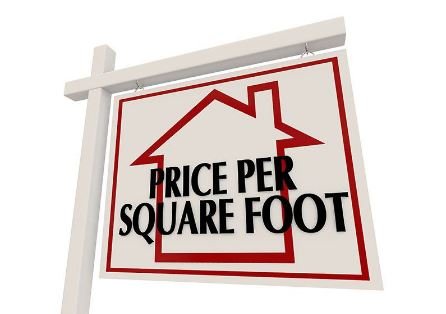There are examples throughout the country where the value of a property is referenced by price per square foot. Human beings often want a simple concept that is easy to convey and understand. This simple unit of measure takes the sale price of the house and divides it by the square footage of the house to derive at a simple unit measure of assumed value. Even if this was a trusted metric, unfortunately, the square footage might not even be right as there is no universal standard that determines this to make it reliable. Many trusted real estate websites and even real estate professionals refer to this metric when selling or attempting to use a valuation model to determine estimated value or list price. Let me tell you why this is not a good unit of measure to value your property.
First you need to understand that in order for this to make sense, all factors for marketability must be equal across the board. Its like saying that the value of a car is equal to the price per horse power regardless of the brand, style, age and condition. That makes about as much sense as determining value as a cost per square foot. Just like there are multiple factors that make up a car besides the horsepower, there are many factors that make up the value of a property that can include the quality of construction, condition, how many bedrooms and bathrooms or even the size of the lot. When you break down a sale price or assumed value based only on the gross living area of a property, you eliminate the other factors that all contribute to the value of the property.
Let’s look at a hypothetical example which happens quite often in Westmoreland County and use a 2,000 sf 2 story home built in the early 2000’s using average quality components and workmanship. These homes have 4 bedrooms and 2 1/2 bathrooms above grade with a finished family room and full bathroom in the basement.
Example 1- Located in Murrysville and is located in an established residential plan with a lot size of approximately 1/2 acre. The home has been well maintained and has a fully remodeled kitchen and bathrooms. This home also has a 2 car integral garage.
Example 1- sold for $350,000 which calculates to $175.00 per square foot.
Example 2- Located in Washington Township which is just north of Murrysville but is serviced by a different school district. This house is located in a more residential rural area and sits on 5 acres of property. This home is exactly the same as example one except this home did not have any remodeling and it has a 3 car detached garage that was built 5 years ago. Its been well maintained but most items have not been replaced.
Example 2- sold for $400,000 which calculates for $200.00 per square foot.
So which one is right- $175.00 or $200.00? Actually, neither. As you can see by these examples, while the houses may be the same in square footage, there are many determining factors that contribute to the value of a property. The higher price per square foot for the second example can be attributed to the lot size and newly built 3 car garage but these are factors that have nothing to do with the square footage of the house.
Our job as an appraiser is to determine those factors that contribute to the marketability of a property. These can include location, quality, condition, utility, lot size and additional amenities such as pools, outbuildings, etc. We use multiple methods to determine how these impact the determinations of both buyers and sellers and apply them accordingly. I can emphatically say that we never calculate value using the price per square foot “method” because we don’t have such a method. The only way price per square foot should be applied is when determining the cost to build a structure.


